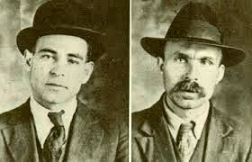A review of
SACCO AND VANZETTI, Directed by Peter Miller, Willow Pond Films, www.willowpondfilms.com
To many anarchists, there are few more sympathetic characters in our movement’s history than Nicola Sacco and Bartolomeo Vanzetti.

That we lost and have to die, does not diminish our appreciation and gratitude for your great solidarity with us and our families. Friends and Comrades, now that the tragedy of this trial is at an end, be all as of one heart. Only two of us will die. Our ideal, you our comrades, will live by millions. We have won. We are not vanquished. Just treasure our suffering, our sorrow, our mistakes, our defeats, our passion for future battles and for the great emancipation.
Be all as of one heart in this blackest hour of our tragedy. And we have heart. Salute for us all the Friends and Comrades on the earth.
We embrace you all and bid you our extreme good-bye with our hearts filled with love and affection.
Now and ever, long life to you all, long life to liberty.
Yours for life and death.
–Nicola Sacco, Bartolomeo Vanzetti (Death House, August 21, 1927)
Prior to the arrests of the Italian-born immigrants for the robbery and double murder of a shoe factory paymaster and a guard in 1920, they were unknown except among the vibrant anarchist community in Boston, where they had immigrated. As Vanzetti later wrote, they were “nameless, in the crowd of nameless ones.” But by the time they were executed by the State of Massachusetts on August 23, 1927, their names were practically household words. Large protests in support of them occurred in every major city in the world, and their funeral in Boston was attended by thousands.
The Sacco and Vanzetti trial was one of the most blatantly fraudulent miscarriages of justice in U.S. history. It is also one of the most famous, since it was obvious that it was their politics which were on trial. The enduring appeal of these two men is evidenced by the torrent of artwork, films, novels, plays, poetry and music that have been dedicated to them, not only at the time of the trial but in the 80 years afterwards. The organized defense of the two anarchists galvanized and often radicalized people around the world from every level of society during the 1920s. Some people still are radicalized when they learn about the case.
Fifty years after the execution, Massachusetts Governor Michael Dukakis, a politician well known for his anti-capital punishment stance, admitted that an injustice was done by issuing a formal proclamation that the two men were victims of an intolerant and unfair legal system, and declared August 23, 1977 “Nicola Sacco and Bartolomeo Vanzetti Memorial Day.”
Director Peter Miller’s documentary utilizes film footage and stills from archival resources that trace the lives of the two ill-fated men. Starting with their childhoods in Italy, Miller follows their arrival in America, continues through their trial and the day of their electrocution and then goes beyond. Interviews with social historians Nunzio Pernicone, Howard Zinn, Mary Ann Trasciatti, Studs Terkel, and several amateur ones tell the story with exceptional passion. Giuliano Montaldo, director of the classic 1971 feature film Sacco e Vanzetti, and composer Anton Coppola are also featured. Singer Arlo Guthrie performs his father Woody Guthrie’s song, “Red Wine,” about the case.
The film does an excellent job of developing the characters of Sacco and Vanzetti, outlining their anarchist philosophies through anecdotes enhanced by poignant excerpts from their prison letters, which are narrated by actors Tony Shalhoub as Sacco and John Turturro as Vanzetti. It also dramatically describes the volatile atmosphere of the Boston-area Italian anarchist community of the time, as well as the reaction by a racist and corrupt legal system. Clear connections are made between the anti-immigrant and anti-radical attitudes which brought about the first Red Scare and those of today’s “War on Terror.”
Despite the 80 years since the tragedy, the film and the story it tells is a timely one. We have not come very far in our treatment of immigrants, or in the fairness of our judicial system. The system itself ensures that. The Sacco and Vanzetti story has generated a great deal of interest, and Peter Miller’s Sacco and Vanzetti provides a modern look at a historical case that will never grow old.
